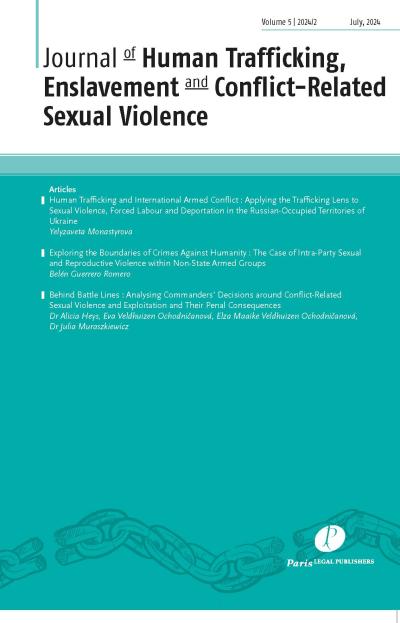In the past years, the UN Secretary-General has continuously stressed the urgency of addressing the nexus between human trafficking and conflict-related sexual violence. Although both crimes are most of the times looked upon separately, there are many similarities to be found.
One can think of the sexual nature that can be found in both crimes, the taboos and stigmas surrounding both crimes, the difficulty in defining the crimes, the focus on law enforcement (prosecution) rather than on prevention, prosecutorial challenges (e.g. protection, secondary victimization, reliance on victims' testimonies), lack of comprehensibly understanding victims' rights and needs, misconceptions about perpetrators and victims, and the fluidity of victim- and perpetrator roles, the consequences of both crimes (e.g. trauma, children born as a result), the causes and purposes of the crimes, to name a few. In addition, how does human trafficking and conflict-related sexual violence compare with the crime of enslavement? Again, there are significant overlaps, although the crimes do not seem to fully coincide.
Human trafficking, enslavement and conflict-related sexual violence take place in times of peace, conflict and post-conflict; the crimes can take place at the same time or follow each other consecutively. In the context of mass migration, men, women and children affected by conflict, displacement or violent extremism are particularly at risk of falling prey to traffickers owing to the collapse of protective political, legal, economic and social systems.
The UN Secretary General in its report on conflict-related sexual violence of 15 April 2017 for the first time reported about the link between conflict-related sexual violence and trafficking in persons. It was held that the term conflict-related sexual violence also encompasses trafficking in persons when committed in situations of conflict for the purpose of sexual violence/exploitation. Developments during the year 2016, including the rise in violent extremism and mass migration, drew attention to the attendant risk of trafficking in persons for the purpose of sexual violence/exploitation. Moreover, in UN Security Council Resolution 2331 (2016) of 20 December 2016, the nexus between human trafficking, sexual violence, terrorism and transnational organized crime was for the first time addressed. With this resolution, sexual violence as a tactic of terrorism was officially acknowledged.
While its importance is time and again stressed, the nexus between human trafficking, enslavement and conflict-related sexual violence is up until now still largely underexplored. The Journal of Human Trafficking, Enslavement and Conflict-Related Sexual Violence aims to fill this gap by researching both the nexus between these crimes and studying the crimes individually.
Disciplines
This journal seeks high quality submissions reflecting multi- and interdisciplinary perspectives addressing domestic, regional, international and comparative developments. The core submissions are intended from the following disciplines:
- Law
- Victimology
- Psychology
- Criminology
- Sociology
- Anthropology
- Medicine
- Political Science
- Economics
- International Relations
- Information Technology
- History
Set-up
The JHEC contains articles, book reviews and case notes/discussion statements.
Peer review
The JHEC uses a double-blind peer review process.
Frequency
Two issues a year; one issue consists of random submissions and one special issue, which relates to a specific theme.
Prices and subscribe
1-Year subscriptions
Our prices are VAT Inclusive.
Editors-in-chief
Dr. Anne-Marie de Brouwer and dr. Eefje de Volder
Impact: Center against Human Trafficking and Sexual Violence in Conflict
Editorial Board
Patrick Cammaert
Major General ret.
Dr. Chris Dolan
Univerity of Warwick
Rina Ghafoerkhan
ARQ National Psychotrauma Center; Utrecht University
Dr. Chiseche Mibenge
Episcopal Relief & Development
Jean Bosco Mutangana
Tilburg Law School, Tilburg University; former Prosecutor General of the Republic of Rwanda
Prof. Valerie Oosterveld
University of Western Ontario Faculty of Law
Dr. Christophe Paulussen
T.M.C. Asser Instituut; International Centre for Counter-Terrorism, The Hague
Prof. Ryszard Piotrowicz
Department of Law and Criminology, Aberystwyth University
Prof. Conny Rijken
Tilburg Law School, Tilburg University
Dr. Pim Scholte
Laguna Collective; Amsterdam University Medical Centers
Dr. Kim Thuy Seelinger
Washington University in St. Louis
Patricia Viseur Sellers
Special Advisor to the Prosecutor of the International Criminal Court; Oxford University; London School of Economics
Dr. Nicole Siller
Deakin University
Dr. Marian Tankink
Consultant Anthropological Research & Training on Gender, Violence and Mental Health
Linda Verhaak
ARQ Centrum 45; ARQ International
Submission of contributions
Contributions to the journal can be sent by e-mail to one of the editors-in-chief: JHEC@impact-now.org
The themes that need addressing relate, but are not limited to:
- Definitional and factual issues concerning conflict-related sexual violence, enslavement and human trafficking in situations of conflict for the prupose of sexual violence or exploitation, such as the definition of the crimes, the perpetrators and victims, and the consequences of the crimes.
- Prevention of the crimes, from different perspectives, such as the role of faith-based and traditional leaders, intergovernmental organisations, NGOs, awareness raising campaigns, and peacekeeping initiatives.
- Addressing the crimes: legal and non-legal mechanisms, such as transitional justice mechanisms and mock tribunals, and reparation efforts, including socio-psychological and medical care and tackling stigma.
- Case studies (contemporary countries or regions of concern), including a discussion from a particular point of view, such as the situation in refugee camps.
More information for authors:
Editorial Policy, Editing Instructions, Rights and Permissions
Call for papers
JHEC (2025-6(1)), for its annual regular issue, welcomes articles on the nexus between human trafficking, enslavement and conflict-related sexual violence or on one or two of these crimes individually.
In short:
- Deadline abstract: 15 December 2024.
- Deadline submission article: 4 April 2025.
- Publication of the volume: July 2025.
- Max. word count: 6,000-8,000 words; references excluded (practitioner’s submission can be lower in number).
For more information, see our info sheet and Editorial Policy, Editing Instructions, Rights and Permissions or e-mail us at jhec@impact-now.org.


